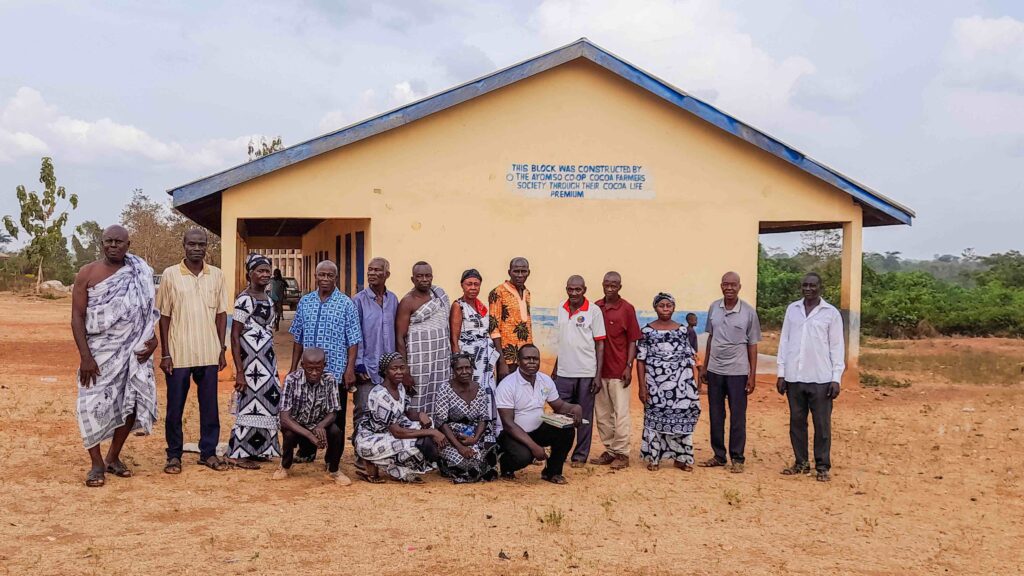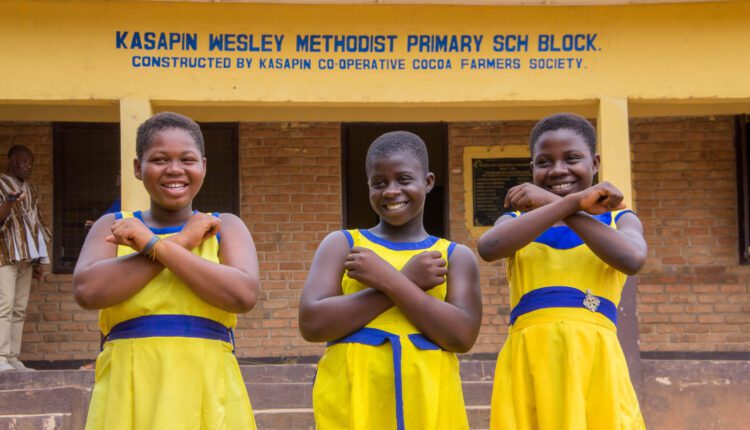Farmers Investing In School Infrastructure To Tackle Child Labour
West African cocoa, particularly from Cote d’Ivoire and Ghana, is battling a negative perception in the marketplace.
Cocoa growers in these countries are contending with the tag of deforestation and child labour on their produce along with the adverse implications on prices, and ultimately farmer incomes.
There are myriad governmental, regulatory and stakeholder interventions geared at tackling these cardinal challenges confronting cocoa sustainability.
Many such interventions only throw money at the problems with no real intent of helping eliminate them from the root.
Shadow-boxing the risks to cocoa sustainability
Cocoa communities have thus become dumping grounds for so-called ‘solutions’ engineered in boardrooms abroad, which neither incorporate the farmer’s voice nor solicit their participation in the implementation.
Owusu Apau, a cocoa farmer in the Akwaduro community of Ghana’s Ahafo Region, said “we have participated in countless sensitisation programmes which ended in the meeting halls.”
He observed quite profoundly that organisations often left behind child labour awareness flyers on their walls whereas their wards still trekked 6 kilometres by foot daily to school in neighbouring communities.
Kids who were either too young or too feeble for the daily journey, therefore, were kept at home or ended up accompanying their parents to the farm in the absence of a daycare facility.
Owusu Apau recollects that a little over 10 years ago, the community through its farmer society or association made a decision to take their destiny into their own hands.
“The rate at which our children dropped out of school was alarming, so parents and community leaders purposed to start a community school with any assistance we received in addition to our meagre contributions,” Apau recalled.
With that decision, the cocoa farmers at Akwaduro community prioritised investments into school infrastructure on a bucket list of goals making up their community action plan.
Today, children of Akwaduro, a cocoa-producing community in the Asunafo North District of the newly created Ahafo Region, don’t need to embark on that long arduous journey on foot to access education.
Spearheading investment in school infrastructure
The community has its own basic school facility constructed without governmental support, while plans are afoot to build a 3-unit junior high school block.
According to Owusu Apau, loyalty premiums paid to the cooperative farmers’ society by Cocoa Life Ghana for their effort in cocoa production have been very instrumental in funding their school infrastructure projects.
“Beyond investing the premiums in our self-help community school infrastructure, Cocoa Life partnered with us to institute a child labour prevention and remediation committee,” noted Apau, who is also the manager of the cooperative farmers’ society.
He added that Akwaduro continues to receive periodic training from implementing partners of the Cocoa Life program, namely Child Rights International, “who also resource us with relevant tools and educational supplies to enhance knowledge exchange between teachers and learners.”

Similar stories cut across about seventy communities in the Asunafo North District that are also partners in the program.
Projects range from health and community centres, mechanised borehole water projects, input storage shops, public lavatories, classroom blocks and teachers’ accommodation.
Madam Felicia Owusu, a society leader at Akwaboahene, a Cocoa Life partner community, stressed that constant sensitisation helped the community appreciate that children could help with domestic chores but must be kept away from the farms and from performing hazardous work.
She explained that with that insight, their society invested loyalty premiums in the renovation of a dilapidated 6-unit community basic school block, and went a step further to build a computer lab to equip learners with ICT skills.
Lagging behind on Goal4 of the SDGs
A major challenge bedevilling education in the Ghanaian countryside, especially in cocoa communities, is the below optimum teacher-learner contact hours due to inadequate teachers.
Education professionals often refuse postings to such communities owing to the lack of accommodation and basic amenities.
Experts have identified this problem as among the causes of the low retention rate of children admitted to schools annually, a situation which begs the United Nations Sustainable Development Goal 4 on quality, inclusive and equitable education for all.
Such was the situation in the cocoa-growing community of Tweapease in the Asunafo North District until the Tweapease Cocoa Farmers Cooperative Society intervened.
They have since invested their loyalty premiums into the construction of an 8-unit teachers’ quarters next to the community basic school compound, complete with a potable water supply and sanitation facilities.
In what appears to be a win-win investment, the teachers and their families are happy, and so are the cocoa farmers who can now focus on their core business.
Complimenting the effort of the individual farmer societies is the district-wide cooperative union, based in Goaso, a town that doubles as the Asunafo North District capital and also the Ahafo Regional capital.
“Thanks to government policy parents do not pay tuition fees, so we come in to support with the provision of school supplies, mainly stationery,” said Daniel Amponsah Gyinayeh, the Union President.
“We also support farmers’ wards entering second-cycle education institutions as well as those opting to learn a trade by sponsoring their apprenticeship,” Gyinayeh disclosed.
Gyinayeh is proud that the hard work of the Union leaders and the commitment of the about 9000 smallholder cocoa farmers making up their membership have resulted in effectively tackling the issue of child labour.
The Asunafo North Cocoa Cooperatives Union is a two-time recipient of the Best Cocoa Cooperative honour at the prestigious Ghana Cocoa Awards, adjudged by its progressive governance structure, adherence to ethical cocoa production standards and impactful social investments.
“I have personally benefitted immensely from the education investment of our farmers’ cooperative society with the support of Cocoa Life,” revealed Jonathan Opoku-Mensah, a cocoa farmer from Antwi-Adjei, a community in the district.
He added, “four of my children received scholarships to study at the university and today one of them is a medical doctor serving patients here in Ghana.”
Opoku-Mensah said he is grateful for the vision of the Asunafo North cocoa farmers and to the union leaders for the impactful decision that led the way to address a critical problem jeopardising the lives of children, tomorrow’s leaders.
- Illegal Mining Threatening Ghana’s $230M Cocoa Rehabilitation - April 10, 2024
- Ghana Raises Cocoa Farmgate Price by 58.26% to GHC2,070 per bag - April 5, 2024
- New Standard for Measuring Cocoa Household Income Launched - April 5, 2024
